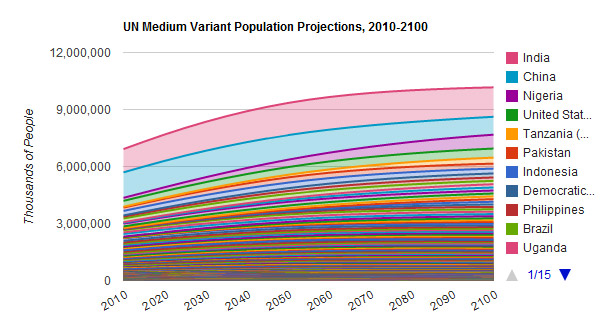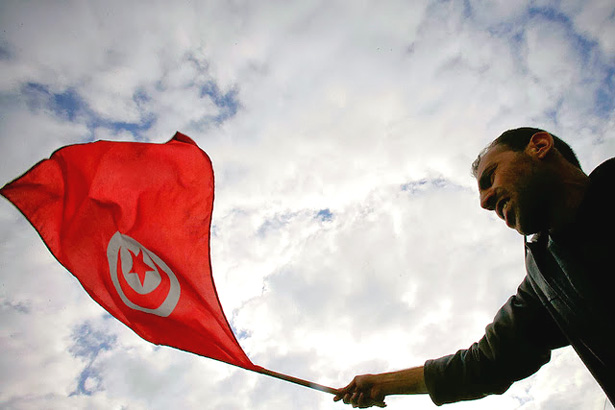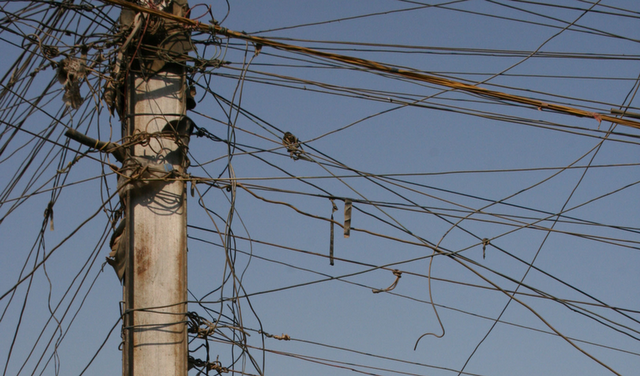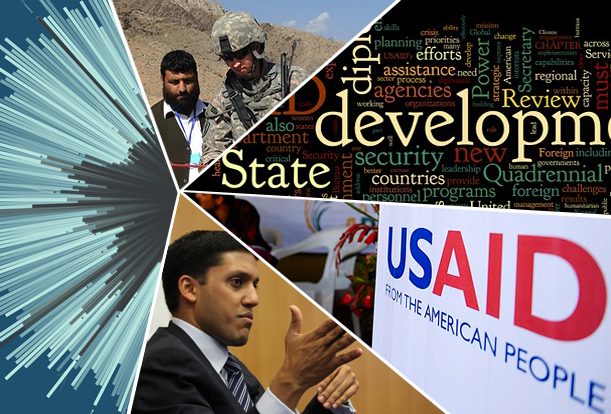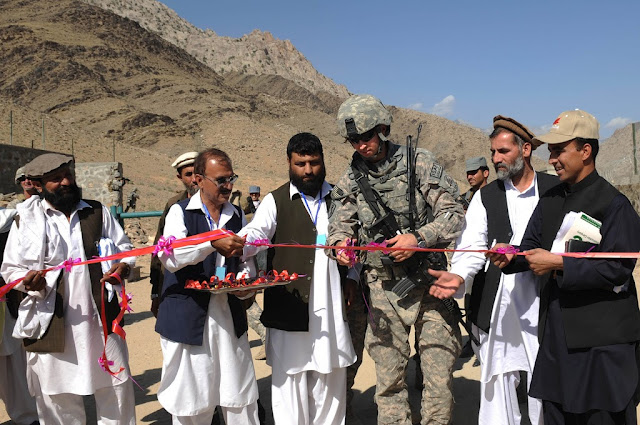-
Ten Billion: UN Updates Population Projections, Assumptions on Peak Growth Shattered
›May 12, 2011 // By Schuyler NullThe numbers are up: The latest projections from the UN Population Division estimate that world population will reach 9.3 billion by 2050 – a slight bump up from the previous estimate of 9.1 billion. The most interesting change however is that the UN has extended its projection timeline to 2100, and the picture at the end of the century is of a very different world. As opposed to previous estimates, the world’s population is not expected to stabilize in the 2050s, instead rising past 10.1 billion by the end of the century, using the UN’s medium variant model.
-
A New Security Narrative: What’s America’s Story for the 21st Century?
›We rarely had to question our place in the world during World War II or the Cold War when good guys and bad guys were easier to identify. A clear narrative, whether in the form of opposing Hitler or containing the spread of “The Evil Empire,” fueled our sense of global mission. Sure there were disagreements, but the big picture (and the big enemy) loomed large.
Our sense of realities, large and small, begins with the stories that frame our understanding of the events around us. The fall of the USSR took the wind out of the sails of our mythic sense of purpose. We were still “us,” but we now lacked a “them.”
A security narrative often emerges from our collective sense of threat assessment. It’s not only about what we stand for, but also what we stand against. On that fateful day of September 11, 2001, many believed that we had found the enemy that would provide the story lacking from our national security narrative since the fall of the Soviet empire. But an ill-defined foe lacking a nation-state home has only contributed to our post-Cold War drift. When we ask ourselves why we are committing military might in Libya (or Afghanistan, or Iraq), we’re really asking bigger questions. What is our purpose in the world? What is the story that defines our friends and our foes? And what does that story tell us about when to sit back or step up? When to watch or when to act?
The lack of a storyline also gives those who hate us the opportunity to define us as evil. So it becomes ever more urgent to start the conversation and to provide a non-partisan forum for what is bound to be a difficult deliberation. When Jane Harman left Congress to accept the leadership post at the Wilson Center, she brought her sense that toxic partisanship prevents Congress from addressing the biggest questions facing the nation in a productive and nonpartisan manner. Under her leadership, the Wilson Center has begun the “National Conversation” series to tackle the toughest issues.
The recently held inaugural event showed great promise. Two active military officers, Captain Wayne Porter (USN) and Colonel Mark Mykleby (USMC), writing under the pseudonym, “Mr. Y,” provided the framework for the discussion. Their vision for a new U.S. security story was presented in a white paper titled, “A National Strategic Narrative.” Their stated purpose is to provide a framework through which to view policy decisions well into the 21st century.
The encounter was lively and challenging, sometimes provocative, but always civil. I can summarize the immediate outcome by reporting a consensus that a narrative is missing and needed. It was a good start, but the discussion needs to continue until we reach a national consensus and not just one among five panelists and a moderator. I will not go into great detail in recapping the arguments and ideas presented, but will instead offer a contribution from each participant to whet your appetite.
Anne-Marie Slaughter, Princeton professor and former Director of Policy Planning for the U.S. Department of State began the session with a summary of the white paper, describing the changing nature of power and influence:We were never able to control international events but we had a much better possibility during the Cold War when you essentially had a bipolar world with two principal actors than we do in a world of countless state and non-state actors. Nobody controls anything in the 21st century, indeed it’s just not a very good century to be – it’s not a good time to be a control freak. [Laughter] Whether it’s your e-mail or global events it’s sort of the same problems. What you can do is influence outcomes. So we have to start by saying it’s an open system; you can’t control it but you can build up your credible influence.
Brent Scowcroft, National Security Advisor to two U.S. presidents, provided an historical framework for the discussion:I think we’re facing a historical discontinuity. The Treaty of Westphalia recognized the existence of the nation-state system codified it and so on. That was a replacement for the feudal system where our sovereignty was vague, divided between kings and princes and landowners and religious leaders. It created a new system and I think the epitome of the nation-state system was the 20th century. I think that globalization writ large is changing that system and globalization is eroding national borders. The financial crisis of 2008 showed us we’ve got a global economic system, what happened in one country spread immediately around. It also showed we don’t have a global way to deal with a global economic situation. Now, this force of globalization to me the best way to look at it is akin to the force of industrialization 250 years ago. Industrialization really created the modern nation state with a lot more power over its citizens to deal with issues than the earlier Westphalia state system had. And it brought the state together. It made it more powerful. Globalization is reacting the same way but in the opposite direction. It is diluting the power of the nation state to deal with the important things.
Thomas Friedman, Pulitzer-prize winning columnist for The New York Times, described the difference between virtual and real action:Exxon Mobil, they’re not on Facebook, they’re just in your face. [Laughter] Peabody Coal, they don’t have a chatroom. They’re in the cloakroom of the U.S. Congress with bags of money. So if you want to change the world, you gotta get out of Facebook and into somebody’s face whether that’s in the U.S. Congress or Tahrir Square. You’ll say, why I blogged on it. I blogged on it, really? That’s like firing a mortar into the Milky Way Galaxy, okay. [Laughter] There is a faux sense of activism out there that is really dangerous. The world, your world, may be digital but politics is still analog and we’ve kind of gotten away from that. Egypt changed. Yes, Facebook was hugely important in organizing people, but the fundamental change happened because a million people showed up in Tahrir Square.
Steve Clemons, founder of the American Strategy Program at the New America Foundation, added this thought on the essence of globalization:What globalization really is, is the disruption of cartels. What blogging is, individual blogging is saying is, I’m not gonna wait for The New York Times editor to tell me no any more or [laughter] to say yes three weeks from now. You know, it is the disruption of cartels and that is happening in every sector of society.
Robert Kagan, senior fellow with The Brookings Institution and a former State Department Policy Planning Officer, cautioned against rushing to utopian conclusions about the impact of our new levels of interconnectedness:Let me just give you an example of how even something new doesn’t necessarily change things the way we want them to or the way we expect them to. I’m positive by the way that human nature is not new. So you’re kind of dealing with the same beast, and I use the term advisably, as you’ve been dealing with for millennia. Let’s talk about the fact that everyone can communicate with each other on the internet. You know, when people communicate with each other especially across national boundaries sometimes it makes them grow closer. Sometimes it makes them hate each other more. If you read the Internet in China now it’s hyper nationalistic. Now, you can argue that because that’s where the government channel said and because they don’t let anybody else or anything else or you could say the Internet is a great vehicle for the Chinese people to express their hatred of the Japanese people. It certainly is doing that now. So does that mean the Internet is going to bring nations closer and solve problems? Not necessarily.
Representative Keith Ellison (D-MN), talked about the expectations of youth and how demographics will be a key consideration when defining a narrative:The Middle East is on my mind a lot these days, what it means if you have all these societies where 50 percent of the population is under 18 years old? You know this is – this has big implications. I mean, this is a demographic reality that is going to have vast implications for the United States. So one thing is it’s not going away because lots of these people who are 18 years old, their cohort just moves through. You know, they’re going to be there a long time and they have demands, they’re going to have needs, they’re going to have expectations. You mentioned justice. They expect us to act justly. And I, when people talk about anti-Americanism, for me part of what’s going on is unmet expectations not just ‘we don’t like it.’
For this abbreviated summary of the discussion, I give the final cautionary word to Steve Clemons, who had this to say in response to an audience question about how to begin the process of constructing a new narrative:This is a town of risk-averse institutions, a town of inertia, a town of vested interests. It’s not a town that really embraces the notion of how do you pivot very quickly and rapidly in a different direction. So, fundamentally you need to begin putting out narratives like this.
A transcript and video of the event is available from the Wilson Center and additional coverage can also be found right here on The New Security Beat.
John Milewski is the host of Dialogue Radio and Television at the Woodrow Wilson Center and can also be followed on The Huffington Post or Twitter.
Photo Credit: Adapted from “1989 – Berlin, Germany,” courtesy of flickr user MojoBaer. -
Tunisia Predicted: Demography and the Probability of Liberal Democracy in the Greater Middle East
›
In 2008, demographer Richard Cincotta predicted that between 2010 and 2020 the states along the northern rim of Africa – Morocco, Algeria, Tunisia, Libya, and Egypt – would each reach a demographically measurable point where the presence of at least one liberal democracy (and perhaps two), among the five, would not only be possible, but probable. Recent months have brought possible first steps to validate that prediction. [Video Below]
-
Watch: Richard Cincotta on Political Demography and Unrest in the Middle East
›March 9, 2011 // By Schuyler Null“Countries that have a high proportion of young people are typically more prone to political violence,” said demographer-in-residence at the Stimson Center, Richard Cincotta, in this interview with ECSP. “That is, not necessarily international war [but] internal conflict, which may take different forms,” including civil and ethnic strife, domestic terrorism, and violent political demonstrations.
The role of unemployed and angry youths in the recent unrest that has swept the Middle East has received a great deal of coverage, but though the region in general is very young, some countries are more so than others.
Tunisia (median age of 29) is actually well into its demographic transition, where fertility declines towards replacement level. “Fertility – the number of children women have in their lifetime – is now lower than it is in the United States,” said Cincotta. As a result, Tunisia’s prospects for achieving a stable, liberal democracy – based on the historical relationship between age structure and political freedoms (see Cincotta’s full post on Tunisia and the two follow-ups for a more complete treatment of that relationship) – are about even.
In contrast, Egypt’s age structure remains young (median age of 24) and Yemen’s (median age of 17) is extremely young. “Those difference are very stark,” said Cincotta, and they play out in the risk of political violence: Tunisia is less likely to experience continuing political violence; Egypt, more so; and Yemen, even more likely.
The relationships between age structure and political violence and the emergence of democratic institutions can be useful in other conflict-prone regions as well. “Afghanistan, Pakistan, Iraq, the Palestinian Authority, most of the central band of sub-Saharan Africa – from Nigeria to the Congo, to Kenya and Ethiopia – we know that these countries are volatile, we’re not always sure why,” said Cincotta. But “age structure gives you a clue, because it tells you something about a lot of barriers that are important to development.”
Sources: UN Population Division. -
What’s Behind Iraq’s Day of Rage? It’s Pretty Basic
›March 4, 2011 // By Schuyler NullIraq’s “Day of Rage” – a phenomenon that has swept the Middle East since Tunisia’s “Jasmine Revolution” – reportedly claimed the lives of nearly 20 people last week. But though the protests may have been inspired by the current broader movement in the region, they are also a symptom of long-standing grievances ordinary Iraqis have had with their government since the American invasion, including lack of public services like access to clean water and especially, reliable electricity.
While these protests alone are unlikely to lead to revolution, they reveal basic livelihood challenges that neither the United States nor the Maliki government have effectively addressed.
The protests in Baghdad and more than 10 other cities were the largest since last summer, when demonstrations over access to electricity led to the death of two protestors in Basra. The New Security Beat spoke to Iraq’s first Minister of the Environment, Mishkat Al Moumin, after those protests to ask her about the lack of services and Iraq’s other non-security challenges, including water security, women’s empowerment, and demographics. She said that decentralizing decision-making power might help alleviate pressure on the government and provide more effective local services:Enacting policies at the local level establishes a sense of ownership among local communities and provides them with an incentive to protect their environmental resources. Moreover, it provides a better opportunity to involve the main stakeholders in policymaking.
Frederick Burkle, senior public policy scholar at the Wilson Center and a senior fellow of the Harvard Humanitarian Initiative at the Harvard School of Public Health, recently cited the military’s failure to restore services, specifically public health services in Iraq, as something the State Department and USAID should seize on to justify the end of “militarized aid.” He pointed out that a 2004 joint report by the Iraqi Ministry of Health and Red Cross found more death and illness was due to the country’s decimated public health infrastructure and social protections than to the violence of war:These indirect deaths from war are preventable but require attention from the occupying powers to the invaded country’s declining public health, social, and physical protections. Iraqis were well aware of this deficiency, and the United States’ lack of attention to the matter led to the loss of lasting trust.
For more on Iraq, be sure to also check out The New Security Beat’s interview with Steve Lonergan, former head of Canada-Iraq Marshlands Initiative, on the state of the southern marshes and their potential for peacemaking.
Sources: Foreign Affairs, The New York Times.
Photo Credit: Adapted from “Tangle of electrical wires in Baghdad,” courtesy of flickr user News Hour (PBS News Hour – Larisa Epatko). -
QDDR Coverage Wrap-up: Institutional Shifts, Development-as-Security, Women’s Empowerment, and Complex New Threats
›February 23, 2011 // By Schuyler NullSomewhat lost in the wake of turmoil in the Middle East and the budget battle in Congress has been the State Department’s most aggressive attempt yet to reshape itself for the dynamic foreign policy challenges of the 21st century.
-
Can Women Help Make Peace Agreements Sustainable?
›The role of women in civil society and their involvement in peace negotiations has been notable, though women have often been overlooked as mediators in peace talks.
On January 20, the Wilson Center’s Middle East Program and the Institute for Inclusive Security (IIS) hosted a meeting titled “Can Women Help Make Peace Agreements Sustainable?” with Luz Mendez, member of the Advisory Council of the Global Fund for Women, Guatemala; Jacques Paul Klein, former United Nations Secretary General’s special representative and coordinator of United Nations operations, Liberia; Alice Nderitu, National Cohesion and Integration Commission, Kenya; and Suaad Allami, director, Sadr City Women’s Center and Legal Clinic, Iraq. Carla Koppell, director of the Institute for Inclusive Security, moderated the event.
Mendez recounted her experiences at the negotiating table during the peace process that ended a 36-year war in Guatemala. She described the shift in that process when the United Nations went from observer to mediator once participants realized the original format was not producing results. Mendez emphasized the challenges she faced when trying to address women’s rights concerns in talks, being the only woman present for four years of the five-year process. She also described the satisfaction she felt when the UN moderator consulted her on the inclusion of particular women’s rights provisions. Mendez also highlighted the ongoing challenges in Guatemala, such as weak implementation mechanisms for the accords, the ubiquity of femicide, and the persistence of socioeconomic grievances.
Klein, who served the UN aiding victims in Bosnia-Herzegovina and Liberia, denounced the violence and hatred that often erupts when a state is too weak to implement rule of law and is unable to turn its human capital into a source of strength. He described the prevalence of human trafficking witnessed throughout his career and the programs implemented to rescue kidnapped and exploited women. He concluded by emphasizing the responsibility and ability that each individual has to foster tolerance and take action against violence and repression.
Nderitu reviewed the origins of ethnic tensions in Kenya, which erupted into violence following elections in 2007-2008, as well as the role of women in the subsequent peace negotiations. She referred to the Kenya National Dialogue and Reconciliation agreements mediated by Kofi Annan, which involved women throughout the peace process. These agreements focused on ending violence and the humanitarian crises while also addressing longstanding issues such as poverty, inequality, and unemployment.
Allami described the rise of the conservative movement in Iraq since the fall of Saddam Hussein, which has effectively limited women’s rights and freedoms codified in the existing Iraqi personal status law. She stated that coalition forces in Iraq helped to limit this trend, but the situation was still contentious because Iraqi leadership tends to not work with women’s groups even though women are mandated to comprise no less than 25 percent of parliament. Allami indicated that female leadership is ultimately weakened if the general female population’s rights are repressed. She also discussed the commitment the international community and the United States have made to Iraqi women.
Koppell concluded by discussing how there are plenty of models throughout the world where women in civil society have been brought into negotiations and peacemaking; policymakers can no longer justify the exclusion of women by claiming there are no proven strategies of inclusion.
Sara Girgis is an intern with the Middle East Program at the Wilson Center.
Photo Credit: “070905-A-5406P-024,” courtesy of flickr user The U.S. Army. Sgt. Yasser Ahmed, a soldier from the Iraqi Army’s 3rd Battalion, 1st Brigade, 11th Infantry Division, talks with a local woman during a patrol in the Graya’at area of Baghdad’s Adhamiyah District Sep. 5. -
First Steps on Human Security and Emerging Risks
›The 2010 Quadrennial Development and Diplomacy Review (QDDR), the first of its kind, was recently released by the State Department and USAID in an attempt to redefine the scope and mission of U.S. foreign policy in the 21st century. Breaking away from the Cold War structures of hard international security and an exclusive focus on state-level diplomacy, the QDDR recognizes that U.S. interests are best served by a more comprehensive approach to international relations. The men and women who already work with the U.S. government possess valuable expertise that should be leveraged to tackle emerging threats and opportunities.
Showing posts from category Iraq.


